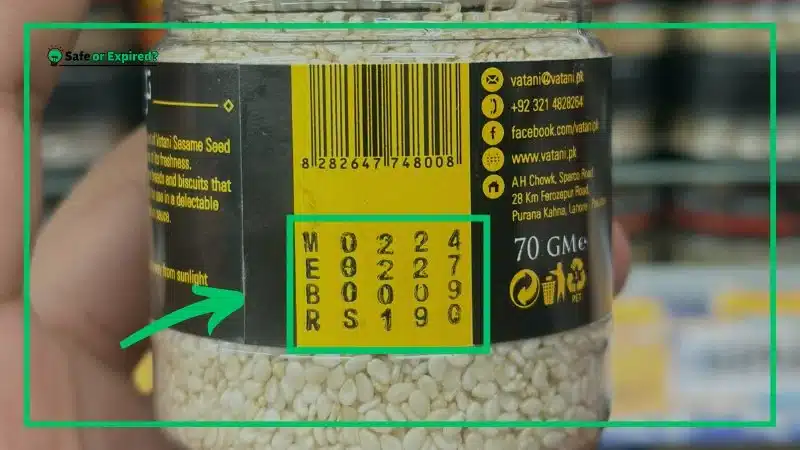“Do sesame seeds go bad?” is a common concern for bakers and chefs. Yes, they do get spoiled, and it’s crucial for everyone to know about the spoilage signs. Learn how to spot bad seeds and avoid wasting your favorite ingredient. Stick to the end.
Do Sesame Seeds Go Bad? Full Breakdown
Yes, sesame seeds do go bad. When stored improperly, they can become rancid, lose their flavor, and develop an off smell, which you won’t like. To keep them fresh longer, store them in an airtight container and ensure sunlight doesn’t ruin them.
People often ask, “Do sesame seeds go bad in the refrigerator?” Yes, sesame seeds can still go bad in the refrigerator, but storing them there can extend their freshness. The cool temperature slows down the process of the oils going rancid and keeps moisture at bay.
However, it’s important to keep them in an airtight container to protect them from humidity and odors from other foods. Even in the fridge, sesame seeds should be used within six months for the best flavor and quality.
Wondering, “Do sesame seeds go bad in the freezer?” Storing sesame seeds in the freezer can significantly extend their shelf life. When kept in an airtight container or a resealable plastic bag, frozen sesame seeds can last up to a year without going bad. The cold temperature prevents the oils from becoming rancid and keeps the seeds fresh.
However, make sure to bring the seeds to room temperature before using them to avoid any moisture from condensation. Freezing is an excellent option if you buy sesame seeds in bulk or don’t use them frequently.
That’s the raw seeds. Want to know do roasted sesame seeds go bad? Roasted sesame seeds can go bad, but they generally have a shorter shelf life than raw seeds. The roasting process brings out their nutty flavor but also makes the oils more prone to becoming rancid over time.
These are the factors that affect sesame seed freshness.
Impact of Moisture
Moisture is one of the biggest enemies of sesame seeds. When sesame seeds are exposed to moisture, they can become moldy and spoil faster. Always make sure your sesame seeds are dry before storing them. If they do get wet, it’s best to use them right away or discard them to avoid any health risks.
Effect of Temperature and Light Exposure
Temperature and light also play significant roles in the freshness of sesame seeds. Heat can cause the oils in the seeds to go rancid quickly, giving them a bitter taste. To prevent this, store sesame seeds in a cool place, like a pantry.
Influence of Packaging on Sesame Seed Longevity
The way you store your sesame seeds can make a big difference in how long they stay fresh. Airtight containers are the best option because they protect the seeds from air and moisture. Glass jars with tight-fitting lids or resealable plastic bags work well.
Avoid leaving sesame seeds in their original packaging if it’s not resealable, as this can lead to faster spoilage.
While learning about sesame seeds, it’s important to clear up some common myths about food storage that could lead to waste or unsafe eating habits. Don’t fall for these common misunderstandings, check out Top 10 Food Preservation Myths Debunked: Know the Facts.
How Long Do Sesame Seeds Last? Clear Explanation
Sesame seeds last 1-3 years when stored properly in an airtight container in a cool, dark place. Toasted sesame seeds have a shorter shelf life of 6-12 months. Storing them in the refrigerator or freezer can extend sesame seeds’ shelf life, preserving freshness and flavor.
However, it’s crucial you consume sesame seeds before the expiration date printed on the jar.

Opened Sesame Seeds
Once opened, sesame seeds should be stored in an airtight container to maintain their freshness. On the counter, they can last for about three months. In the refrigerator, their shelf life extends to six months, while in the freezer, they can remain fresh for up to a year.
Always check for any off smells or changes in taste to ensure they are still good to use.
Unopened Sesame Seeds
Many people ask, “How long do unopened sesame seeds last?” Unopened sesame seeds have a longer shelf life because they are sealed in their original packaging. On the counter, they can last for up to six months. If stored in the refrigerator, they can stay fresh for about a year, and in the freezer, they can last for up to two years.
Keeping them in a cool, dark place helps to preserve their quality and flavor.
Here’s the shelf life table of sesame seeds:
| Storage Condition | Opened | Unopened |
| Counter (Room Temperature) | 3 months | 6 months |
| Refrigerator | 6 months | 1 year |
| Freezer | 1 year | 2 years |
How to Know Sesame Seeds Have Gone Bad?
Sesame seeds go bad when they smell rancid, taste bitter, or show signs of mold. Fresh seeds have a mild, nutty aroma and a pleasant taste. If you notice any off smells or tastes, it’s time to discard them.
Smell
One of the easiest ways to tell if sesame seeds have gone bad is by smelling them. Fresh sesame seeds have a mild, nutty aroma. If your seeds have a strong, unpleasant, or rancid smell, they are no longer good to eat.
The oils in sesame seeds can turn rancid over time, especially if they are exposed to heat, light, or moisture. Always give your sesame seeds a sniff test before using them in your recipes. If they don’t smell right, it’s best to throw them away to avoid any unpleasant taste in your food.
Taste
Taste is another good indicator of whether sesame seeds have gone bad. Fresh sesame seeds have a pleasant, nutty flavor. So, What do rancid sesame seeds taste like?
If you taste a few seeds and they are bitter or have an off flavor, they have likely gone bad. The oils in the seeds can turn rancid, making them taste unpleasant.
It’s important to check the taste before adding them to your dishes, especially if they’ve been stored for a long time. If the taste isn’t right, it’s safer to discard the seeds and use a fresh batch to ensure your food tastes its best.
Appearance
The appearance of sesame seeds can also tell you a lot about their freshness. Fresh sesame seeds are small, smooth, and usually uniform in color, whether they are white, black, or brown. If you notice any discoloration, such as dark spots or a dull appearance, the seeds might be spoiled.
Mold is another clear sign that sesame seeds have gone bad. If you see any fuzzy or powdery growth on the seeds, it’s best to discard them immediately. Keeping an eye on how your sesame seeds look can help you avoid using spoiled seeds in your cooking.
Texture
The texture of sesame seeds can change when they go bad. Fresh sesame seeds are dry and slightly crunchy. If your seeds feel sticky, clumpy, or soft, they may have absorbed moisture, leading to spoilage. This change in texture is often accompanied by an off smell or taste.
To prevent this, always store your sesame seeds in a dry, airtight container. If you notice any unusual texture, it’s a good idea to check for other signs of spoilage before using them. Proper storage can help maintain the seeds’ original texture and ensure they stay fresh longer.
Do Black Sesame Seeds Go Bad?
Yes, black sesame seeds can go bad. Like other sesame seeds, they can become rancid if exposed to heat, light, or moisture. Black sesame seeds generally last longer than white ones due to their higher antioxidant content.
However, they should still be used within six months if stored at room temperature, or up to a year if refrigerated or frozen. Always check for any off smells or tastes before using them.
Do White Sesame Seeds Go Bad?
Yes, white sesame seeds do go bad. When not stored properly, they can become rancid and lose their flavor. White sesame seeds typically last about three months at room temperature, six months in the refrigerator, and up to a year in the freezer.
Always smell and taste them before use; a rancid smell or bitter taste indicates they have spoiled and should be discarded.
Do Dried Sesame Seeds Go Bad?
Yes, dried sesame seeds can go bad, but they usually last a long time due to their low moisture content. This dryness helps keep them fresh by reducing the chance of mold and bacteria growth. However, they can still become rancid if exposed to air, light, or heat.
The good thing is that they can last up to six months at room temperature and even longer if refrigerated or frozen.
Do Toasted Sesame Seeds Go Bad?
Yes, toasted sesame seeds can go bad, often faster than raw or dried seeds. The toasting process releases oils that can turn rancid more quickly if not stored properly. Their shelf life is usually shorter, around three months at room temperature.
You can extend this by refrigerating or freezing them, which helps maintain their flavor and crunch.
How Long Do Sesame Seeds Last After the Expiration Date?
Sesame seeds can last several months to a year past the expiration date if stored properly in an airtight container. Make sure you put this container away from sunlight. Before eating, check for a rancid smell or bitter taste, which indicates spoilage.
Check the Smell and Taste
First, always give your sesame seeds a good sniff and a small taste. Fresh sesame seeds have a mild, nutty aroma. If they smell off or taste bitter, they’ve probably gone bad. I always trust my nose and taste buds because they’ll never steer me wrong.
Look for Mold or Discoloration
Next, take a close look at your sesame seeds. Fresh seeds should be dry and their a natural color. If you see any mold or they look darker than usual, it’s best to toss them. I’ve learned that a quick visual check can save a lot of trouble later on.
Store Them Right
Proper storage can extend the life of sesame seeds, even past their expiration date. Keep them in an airtight container, away from heat and moisture. I always use a good, tight jar and store them in my pantry or fridge. This way, I know they’ll stay fresh longer.

Freezer is Your Friend
If you’re not using sesame seeds often, the freezer is a great option. Freezing them can keep them fresh for up to a year or more. I usually freeze a big batch and just take out what I need. It’s super easy and keeps them fresh as new.
Expiration Dates Are a Guide
Remember, expiration dates are more about peak freshness. Sesame seeds don’t suddenly go bad the day after the date
What Happens if You Eat Rancid Sesame Seeds?
Eating rancid sesame seeds can lead to an unpleasant taste and possible digestive discomfort. Rancid seeds may contain harmful compounds that can cause nausea, stomach upset, or other minor health issues. It’s best to avoid eating rancid seeds to stay safe.
Unpleasant Taste and Smell
Rancid sesame seeds have a strong, unpleasant smell and a bitter taste. When oils in the seeds go bad, they produce these off flavors and odors. Eating rancid seeds won’t taste good and can ruin your meal.
The bitterness is hard to ignore, and it might make you spit out the food. Always check the smell and taste of your sesame seeds before using them to avoid this issue. Fresh seeds should have a mild, nutty flavor that enhances your dishes.
Digestive Discomfort
Consuming rancid sesame seeds can cause digestive discomfort. This might include nausea, stomach cramps, or even vomiting in some cases. The harmful compounds formed when the oils in the seeds go bad can irritate your stomach lining.
While eating a small amount might not make you very sick, it’s best to avoid rancid seeds altogether. If you ever feel unwell after eating them, drink plenty of water and rest until the symptoms pass. To prevent this, always store your sesame seeds properly and check them before use.
Potential Health Risks
Long-term consumption of rancid foods, including sesame seeds, may pose some health risks. Rancid oils contain free radicals, which can damage your cells over time. This damage might increase your risk of certain health issues if you frequently consume rancid foods.
Although eating rancid sesame seeds occasionally is unlikely to cause serious harm, it’s a good habit to ensure your seeds are fresh. Fresh sesame seeds not only taste better but are also better for your health.
Now that you understand the shelf life of sesame seeds, you might be curious about other seeds like pumpkin seeds. Learn whether they go bad and how to store each type in Pumpkin Seeds Shelf Life: Comprehensive Guide for Every Type.
Conclusion
Keeping sesame seeds fresh is easy with the right tips. Here’s a quick summary:
- Sesame seeds can go bad if not stored properly.
- Always check for a rancid smell and bitter taste.
- Store in an airtight container away from heat and moisture.
- Refrigerate or freeze to extend shelf life.
- Proper storage keeps your sesame seeds fresh and tasty for longer.
By following these simple guidelines, you can enjoy fresh, flavorful sesame seeds in all your favorite dishes. Happy cooking!

